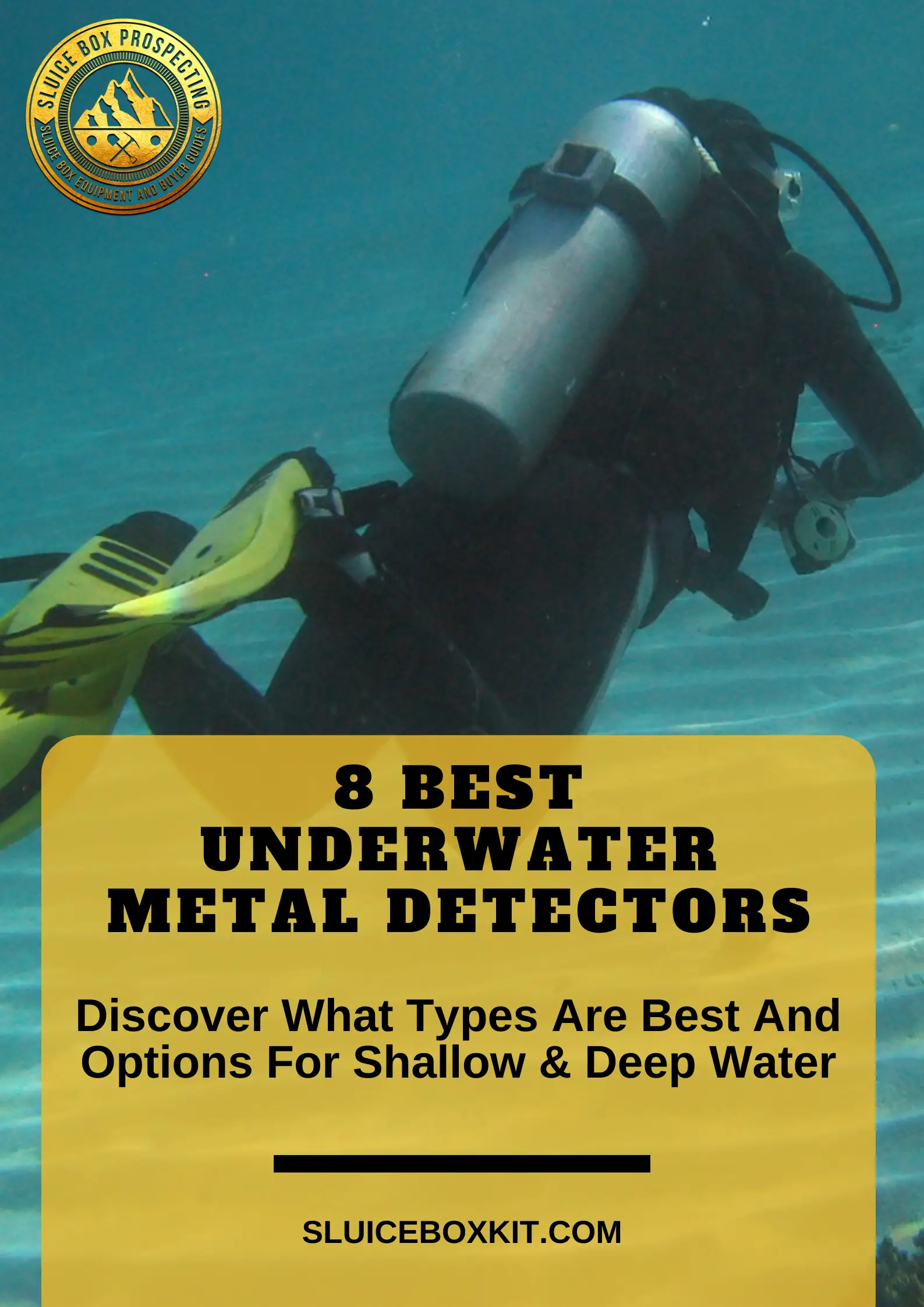When you’re looking for the best underwater metal detector, there are a few factors to consider. How deep do you plan to use it? What type of environment will you be scanning? How often will you be using it?
These are all important questions to answer before making your purchase. In this blog post, we will discuss the 9 best underwater metal detectors and explain how to choose the right one for your needs!
Important Features To Considering When Purchasing An Underwater Metal Detector
Table of Contents
When choosing an underwater metal detector, there are several features that are most important to consider. The first is the depth range. This is the maximum depth that the detector can be used in.
The second is the waterproof rating. This is the minimum water resistance that the detector has. The third is the weight of the detector. This is important because it determines how easy it is to use underwater.
The fourth and final feature to consider is the type of coil. There are two types of coils: concentric and DD (double-D). Concentric coils have a round shape and DD coils have an oval shape. Each type has its own advantages and disadvantages, so you’ll need to decide which one is right for you based on your needs.
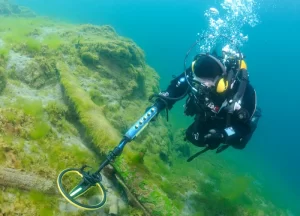
4 Critical Features Of The Best Underwater Metal Detectors
- Depth range
- Waterproof rating
- Weight and portability
- The type of search coil
These factors are necessary to consider when choosing an underwater metal detector. The most important factor is the depth range, followed by the waterproof rating and weight of the detector. The coil type is also important, as it will determine how easy the detector is to use underwater.
What Types Of Metal Detectors Work In Water?
There are two types of underwater metal detectors: Pulse Induction (PI) and Very Low Frequency (VLF). Each type of waterproof metal detector has a different method for detecting metals.
- Pulse induction metal detectors send out magnetic pulses that penetrate the ground, water, or sand.
- Very low-frequency metal detectors work by sending out electromagnetic waves.
Pulse induction underwater metal detectors are more expensive, but they offer many advantages. They are not affected by saltwater or minerals in the ground, so they can be used in both fresh and saltwater. Pulse induction models have a higher depth range and can be used in deeper water than VLF detectors.
Very low-frequency underwater metal detectors are less expensive and easier to find, but they have some drawbacks. They are more susceptible to interference from saltwater and minerals in the ground, so they work best in freshwater. VLF models also have a shorter depth range and cannot be used in as deep water as pulse induction detectors.
How Deep Can You Use A Metal Detector In Water?
The depth range of an underwater metal detector depends on the type of detector and the environment in which it will be used. For example, a pulse induction model can be used at depths of up to 200 feet, while a VLF model may only have a depth range of 20-30 feet.
The best way to determine the depth range of your underwater metal detector is to read the product description carefully before making your purchase.
Now that you know what to look for when purchasing an underwater metal detector let’s look at the best models on the market.
8 Best Underwater Metal Detectors
The following list includes underwater metal detectors that are waterproof and submersible. They are durable and can withstand depths of up to 200 feet. Most of these models also come with a headset, so you can hear audio underwater.”
In addition, we’ve included a few options that are perfect for shallow water conditions. These models have an IP68 waterproof rating, meaning they can be submerged in up to six feet of water for one hour without sustaining damage.
- Garrett ATX
- Tesoro Sand Shark II
- Nokta Makro Legend
- Minelab Equinox 800
- Minelab Excalibur II
- Garrett Sea Hunter Mark II
- Fisher 1280X Aquanaut
- Nokta Makro PulseDive
4 Best Underwater Metal Detectors Up To 10 Feet
Garrett ATX
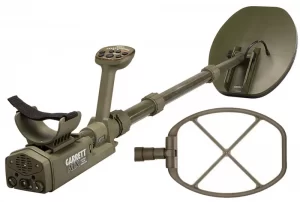
The Garrett ATX Pro is a pulse induction underwater metal detector that can be used at depths of up to 10 feet. It has several features that make it ideal for underwater use, including a headset so you can hear audio underwater and an IP68 waterproof rating.
Tesoro Sand Shark II
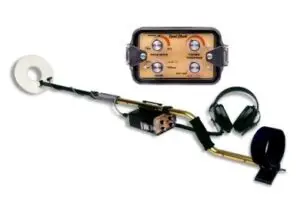
The Tesoro Sand Shark II is a pulse induction waterproof metal detector that is less expensive; however, they are difficult to find. You may need to search on eBay or Facebook Marketplace to locate one. It has a depth range of 200 feet and is perfect for freshwater use.
Nokta Makro Legend Waterproof Metal Detector
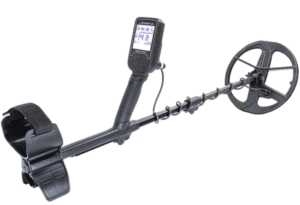
If you’re looking for a quality metal detector that can be used in underwater environments, the Nokta Makro Legend is the perfect option. This detector uses multi-frequency detection to identify targets in murky water, and it’s completely waterproof so you can use it in any body of water. Plus, the Legend is lightweight and easy to use, making it perfect for beginners or experienced treasure hunters alike.
Minelab Equinox 800
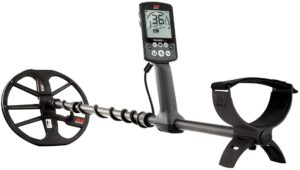
The Minelab Equinox 800 is multi-frequency to locate targets with a wider range of low and high frequencies. It is waterproof up to ten feet and weighs just under 3 lbs. It is great for beginners and those with more experience and is optimal for coins, gold, and relics in sandy areas.
4 Best Underwater Metal Detectors Up To 200 Feet
Minelab Excalibur II
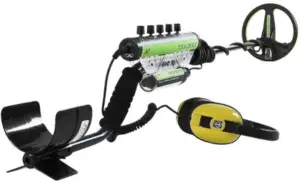
The Minelab Excalibur II is a true underwater metal detector that can be used at depths of up to 200 feet. It comes with several search modes and 17 different frequencies making it ideal for underwater use. It also includes a headset so you can hear audio underwater, an IP68 waterproof rating, and a 20-25 hour battery life.
Garrett Sea Hunter Mark II
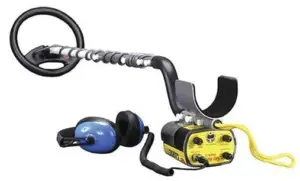
The Garrett Sea Hunter Mark II is a pulse induction underwater metal detector that can be used at depths of up to 200 feet. It comes with some features that make it ideal for underwater use, including a headset so you can hear audio underwater and an IP68 waterproof rating. It weighs 3 lbs.
Fisher 1280X Aquanaut
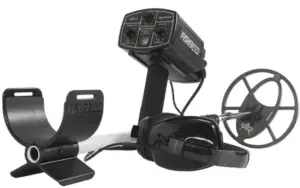
The Fisher 1280X Aquanaut is a very low-frequency underwater metal detector that is less expensive and easier to find than pulse induction models. It has a depth range of 250 feet and is perfect for diving, and beach hunting in fresh or saltwater.
Nokta Makro PulseDive
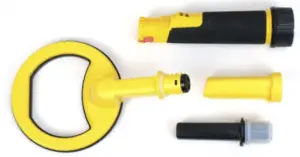
The Nokta Makro PulseDive is a handheld underwater metal detector for deep dives up to 200 feet. It is a pulse induction underwater metal that offers a number of advantages over VLF models. It is not affected by saltwater or minerals in the ground, so it can be used in both fresh and saltwater. This unit is ideal for divers and those who do not need multiple crossover functions for land and water.
Which Underwater Metal Detectors Are Best For Finding Gold?
If you’re looking for an underwater metal detector that is specifically designed for finding gold, there are a few models that stand out:
The Minelab Excalibur II is a multi-frequency underwater metal detector that can be used at depths of up to 200 feet. It comes with many features that make it ideal for underwater use, including a headset so you can hear audio underwater and an IP68 waterproof rating.
The Garrett ATX is a pulse induction underwater metal detector that can be used at depths of up to 200 feet. It has many features that make it ideal for underwater use, including a headset so you can hear audio underwater and an IP68 waterproof rating.
The Minelab SDC 2300 Gold Metal Detector is a pulse induction underwater metal detector that offers several advantages over VLF models. It is not affected by saltwater or minerals in the ground, so it can be used in both fresh and saltwater. It is fully submersible up to 10 feet.
If you’re looking for an underwater metal detector specifically designed to find gold, these are three models that stand out. Each has its advantages and features that make it ideal for underwater use. So, depending on your individual needs, you can choose the underwater metal detector that’s right for you.
Best Tips For Finding Treasures With An Underwater Metal Detector
- Patience is key when using a metal detector. The more time you spend searching, the greater your chances of finding something valuable.
- Focus your search on areas where there is likely to be a concentration of objects. This includes areas near docks, beaches, and lakes.
- Be sure to follow all local laws and regulations when using a metal detector in waters. This includes obtaining any necessary permits or licenses.
- If you are new to metal detecting in water, it is best to start with a shallow area search. This will help you get familiar with the equipment and how it works. Once you feel comfortable, you can move on to deeper water searches.
- Research an area before you start searching. This will help you to identify areas where there is likely to be a concentration of objects.
- Waterproof metal detectors are sensitive and have multiple features to be aware of. Be sure to read the instructions carefully before using them and avoid using them in areas with rocks or other sharp objects.
5 Tips For Using An Underwater Metal Detector In Shallow Water
- Start by choosing a model with an IP68 waterproof rating.
- Submerge the detector in the water and slowly move it back and forth.
- Be sure to keep the coil close to the bottom of the pool or lake.
- If you find an object, use the pinpoint feature to help locate it.
- Digging in sand or mud can be difficult, so consider using a small shovel or trowel.
6 Tips For Using An Underwater Metal Detector In Deep Water
- Pulse induction models are best for deepwater use.
- Attach the detector to a long pole or rod for added reach.
- Lower the coil into the water and slowly move it back and forth.
- Be sure to keep the coil close to the surface.
- If you find an object, use the pinpoint feature to help locate it.
- Digging in sand or mud can be difficult, so consider using a small shovel or trowel.
Additional Accessories When Using An Underwater Metal Detector:
Metal Detecting Headphones:
Headphones are necessary for underwater use because they allow you to hear audio underwater. Choose headphones specifically designed for underwater use and have an IP68 waterproof rating.
Extension Poles & Rods
A pole or rod is necessary for deepwater use because it allows you to reach objects out of your depth range. Choose a pole or rod made of durable material and is the appropriate length for your height.
Metal Detecting Shovels & Trowels:
A shovel or trowel is necessary for digging in sand or mud. Choose a shovel or trowel made of durable material and is the appropriate size for your needs.
Underwater Metal Detector Summary
There are underwater metal detectors that can be used for both shallow and deep water. The best type of model depends on what kind of terrain you’re going to search in, so make sure before purchasing one how far below sea level your intended hunting area will extend!
Pulse Induction models produce signals best suited toward deepwater exploration, while IP68 waterproof versions provide clearer results when used close together on shallow waters–just like regular land-based detectors!
Lastly, remember to have patience as locating valuable items may take some time. Follow these tips, and you’re sure to have a successful underwater treasure hunt!

